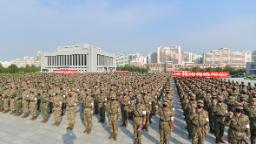
The Korean Central News Agency (KCNA) said that between Friday and Saturday there had been 186,090 new cases, 299,180 recoveries and one death.
If true, that figure would be a marked drop — the country has been reporting more than 200,000 of what it terms “fever cases” every day for the past week in an outbreak that has infected more than 2.5 million people and killed 67, according to official figures.
However, given the lack of independent reporting inside North Korea, it is difficult to verify the figures and there has long been widespread skepticism over the country’s Covid reporting.
Before the current outbreak was announced earlier this month, North Korea claimed to be Covid-free. The country of 25 million reported what it said were its first cases earlier this month, referring to the outbreak as “explosive,” raising fears about the ability of the country’s dilapidated health care infrastructure to cope.
North Korea is not known to have imported any coronavirus vaccines and has previously snubbed offers such as one from China last year to provide nearly three million doses of its Sinovac shots.
On Monday, three North Korean cargo planes flew to China and back, according to a South Korean government official with knowledge of the matter. It is not known what the planes were carrying, but the rare trip came after China pledged to help North Korea with its Covid outbreak.
United States President Joe Biden, who is currently visiting South Korea as part of his first trip to Asia, said on Saturday the US had also offered to provide vaccines to North Korea but that Pyongyang has not responded.
A senior US administration official said on Sunday that Covid restrictions may be playing a role in Pyongyang’s lack of response to offers of talks, Reuters reported.
“The fact that Kim Jong Un has decided to come out and publicly announce this health crisis is quite telling,” Lina Yoon, a senior Korea researcher at Human Rights Watch told CNN. “(It) may have a political element, obviously.”
North Korea’s state media claims its outbreak peaked at over 390,000 new cases on Monday. After showing “rapid growth in the beginning” the outbreak is now in decline, it claims, “after being stably controlled and managed.”
Among the actions KCNA credited were “intensive disinfection efforts” by nearly 200,000 medical and anti-epidemic workers at around 100,000 spots nationwide, including waste and sewage treatment plants.
It also said military medics had been deployed to 670 pharmacies in Pyongyang to supply medicine around the clock and “around 20 mobile temporary medicine service centers” had been created to distribute medicine “faster and more accurately.”
North Korea’s present problems are not limited to the outbreak. There have also been suggestions it is facing widespread food shortages, caused in part by strict border lockdowns that were meant to keep the virus out.

